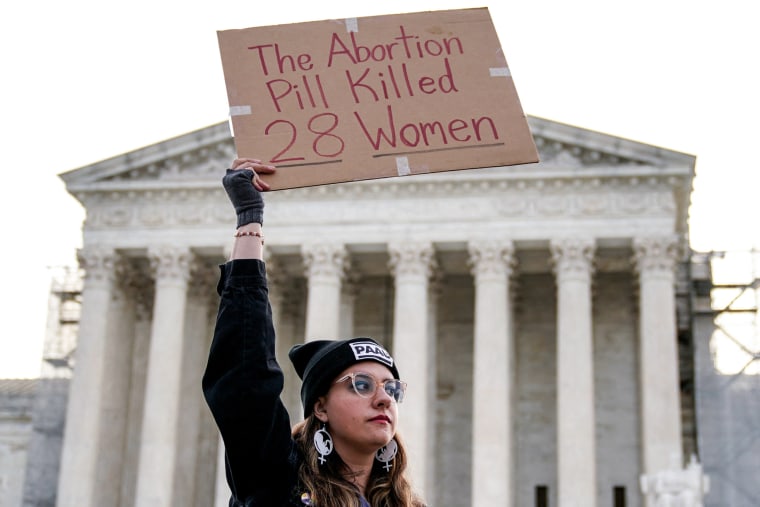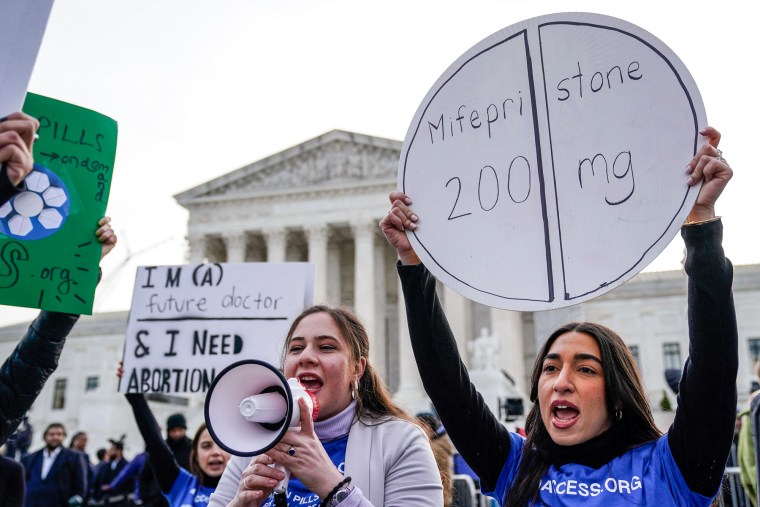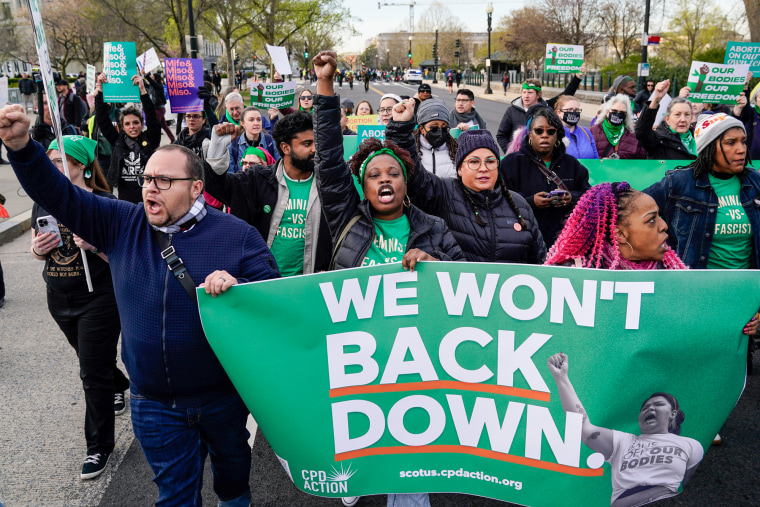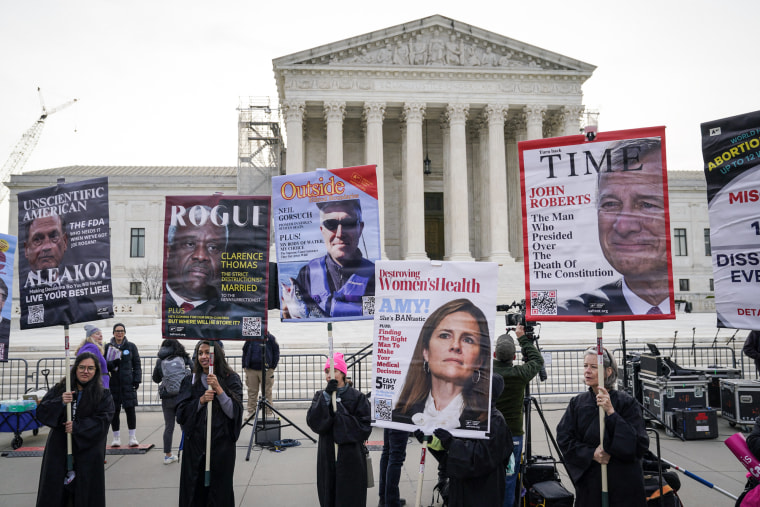What to know about today's hearing
- The Supreme Court heard a challenge to the Food and Drug Administration's decisions over the past several years to increase women's access to mifepristone, a drug used in medication abortions, including making it available by mail. Many of the justices appeared to be questioning whether abortion opponents would have standing to sue over the decisions.
- A Texas-based U.S. district judge invalidated the FDA's approval of the pill last year, but an appeals court narrowed the decision to include only actions the agency has taken since 2016. Because the Supreme Court is not reviewing the FDA's initial approval of the drug, the medication will remain available in some form.
- Fourteen states completely ban abortion, including medication abortion, according to the Guttmacher Institute, a research group that supports abortion rights, while several others prohibit delivering the abortion pill by mail and require patients to see a doctor in person before they can get a prescription for it.
- About two-thirds of abortions in the United States were carried out by use of the pill in 2023, the research group says.
Abortion providers react to Supreme Court hearing
Abortion providers responded to today's oral arguments by emphasizing the safety and effectiveness of mifepristone, stressing that reduced access to the drug could threaten public health.
“The very existence of this case puts every other FDA-approved medication at risk of being taken off the market or restricted for political reasons,” Alexis McGill Johnson, CEO of Planned Parenthood Federation of America, said in a statement.
Amy Hagstrom Miller, CEO of Whole Woman’s Health, an abortion provider with in-person clinics in four states, said her virtual clinic will continue to offer abortion pills by mail while the court considers the case.
“This cruel and baseless lawsuit is designed to intimidate and confuse Americans," Miller said in a statement. "This case is not about health and safety; it’s about power and control. Here is the truth: medication abortions are safe and effective.”
Evan Masingill, CEO of GenBioPro, the generic manufacturer of mifepristone, said Tuesday that the company “will continue to use every legal and regulatory avenue to protect access” to the drug.
New York attorney general speaks at rally for abortion pill access outside Supreme Court
New York Attorney General Letitia James joined abortion rights supporters during a protest outside the Supreme Court today.
Erin Hawley spotted outside of the Supreme Court near protesters
After delivering oral arguments before the Supreme Court, Erin Hawley was seen outside of the court near protesters, flanked by two bodyguards.
Supreme Court skeptical of effort to make abortion pill harder to obtain
WASHINGTON — The Supreme Court on Tuesday appeared likely to reject a challenge to the abortion pill mifepristone, with a number of justices indicating the lawsuit should be dismissed.
The court, which has a 6-3 conservative majority, heard oral arguments on the Biden administration’s appeal of lower court rulings that restricted women’s access to the pill, including its availability by mail.
But during the arguments, there was little discussion of whether the Food and Drug Administration’s decisions to lift restrictions on the drug were unlawful.
Instead, the justices focused on whether the group of anti-abortion doctors who brought the lawsuit even had legal standing to bring the claim. The plaintiffs, represented by the Alliance Defending Freedom, a conservative Christian legal group, argue that the FDA failed to adequately evaluate the drug’s safety risks.
But justices probed whether the doctors could show that they were directly injured merely because they object to abortion and could be required to give emergency room treatment to a woman suffering from serious side effects.
Several justices also noted that doctors who oppose abortion can already object based on their personal beliefs to assisting patients suffering from abortion-related side effects.
“Under federal law, no doctors can be forced against their consciences to perform or assist in an abortion, correct?” conservative Justice Brett Kavanaugh asked at one point.
Sen. Josh Hawley was in court for his wife's arguments
Sen. Josh Hawley was in attendance during his wife’s arguments on behalf of the Alliance for Hippocratic Medicine, which is suing the FDA.
The Republican senator from Missouri and his wife, both of whom graduated from Yale Law School, met while they clerked for Chief Justice John Roberts.
Jackson repeatedly asked about the deference courts should pay the FDA
In her questioning today, Jackson repeatedly asked iterations of whether courts owe any deference to the opinion of the expert agency concerning the safety and efficacy of drugs. In her response, Hawley said the defendants are not asking the court to second-guess FDA determinations at all, but rather to look at what the FDA has said.
After Jackson said she doesn’t understand how that scope of review is not, in fact, second-guessing the FDA, Hawley pushed back, saying she didn't think that’s an accurate portrayal and that the FDA’s statements in 2016 and 2021 were “arbitrary.”
Danco lawyer pushes back against justices citing debunked scientific studies
After being questioned by Justice Alito about the potential adverse consequences of mifepristone, Ellsworth said she had “significant concerns” about justices parsing medical and scientific studies.
Ellsworth said the Texas district court’s ruling relied on an analysis of anonymous blog posts and another set of studies that have since been retracted.
“Those sorts of errors can infect judicial analyses precisely because judges are not — they are not experts in statistics, they are not experts in the methodology used for scientific studies for clinical trials,” Ellsworth said.
The district court’s ruling cited statistics from an analysis of anonymous posts about negative abortion experiences on the website Abortion Changes You. The study’s co-author is a senior research associate at the Charlotte Lozier Institute, an anti-abortion group.
The ruling also cited two studies supported by the Charlotte Lozier Institute that claimed to find harms associated with abortion. The publisher, Sage Perspectives, retracted both studies after an independent review found the conclusions weren’t valid.
Oral arguments conclude
Today's oral arguments before the Supreme Court have ended.
Prelogar offers a rebuttal to Hawley
The solicitor general is offering a rebuttal to Hawley's argument, arguing that the doctors she represents don't have any clear harms and so the standing argument is speculative.
She also said the doctors group that Hawley represents doesn't have organizational standing and the remedy is overly broad.
Thomas, Alito bring back focus on Comstock Act
Thomas and Alito are questioning Hawley about the relevance of the Comstock Act.
Gorsuch questions a nationwide injunction
Gorsuch raised the possibility of this case turning what could be a small lawsuit into a nationwide injunction on an FDA rule or any other federal government action.
Hawley said she thinks it’s impractical to raise a conscientious objection, but that the district court remedy was appropriate under Section 705, which grants the authority for courts to issue necessary and appropriate relief.
Asked why the court can’t specify that this relief runs to the parties before the court as opposed to looking to the FDA in general, Hawley said the only availability for relief from nonregulated parties is if the court does something to the FDA order or regulation at issue.
Most of the justices, including Gorsuch and Chief Justice John Roberts, seem skeptical of her argument.
Kagan grills Hawley on conscience objections by anti-abortion doctors
Justice Elena Kagan drilled down again on the conscience objections of anti-abortion doctors Hawley represents.
Hawley said one of the doctors, for example, had to perform a surgical abortion (a D&C) because of a "life-threatening emergency."
"And did she have an opportunity to object?" Kagan asked.
"No, your honor," Hawley said. "Again, these are life-threatening situations in which the choice for a doctor is either to scrub out and try to find someone else or treat the woman."
Kagan says that most hospitals have mechanisms or routines in place "to ensure" doctors can make objections to performing certain procedures in advance.
"There's just nothing that you have there," Kagan says about Hawley's supporting arguments.
Jackson pushes Hawley on why doctors can't just refuse to treat patients
Jackson pushed Hawley on whether doctors couldn't just object to doing these procedures. Hawley argued that the emergency nature of these cases makes it impossible for doctors to lodge objections.
Jackson questioned whether the court has to "entertain your argument that no one in the world can have this drug ... in order to protect your clients."
Gorsuch followed up on Jackson's questioning, asking why this lawsuit was "turning what could be a small lawsuit into a nationwide legislative assembly on an FDA rule."
Danco lawyer presents argument
Attorney Jessica Ellsworth, who represents Danco, the manufacturer of mifepristone, argued that anti-abortion groups' view is "so inflexible it would upend not just Mifeprix, but virtually every drug approval" the FDA has made for decades.
The changes that the FDA made to the drug’s approved use in 2016 and 2021 — which made it easier to access — can't be linked to a possible harmful event in the future, Ellsworth argued.
Danco lawyer expresses concerns about judges making decisions on pharmaceuticals
Asked by Jackson whether she thinks courts have specialized scientific knowledge with respect to pharmaceuticals and if she has concerns about judges making decisions on them, Ellsworth said Danco has “significant concerns” on the matter, noting that those concerns are shared among pharmaceutical companies that depend on the FDA to approve their drugs.
As an example, Ellsworth mentioned that a district court relied on a study that was based on an analysis of anonymous blog posts and other studies that contain misleading presentations of data.
“Those sorts of errors can infect judicial analyses precisely because judges are not experts in statistics. They are not experts in the methodology used for scientific studies for clinical trials,” Ellsworth said. “That is why the FDA has many hundreds of pages of analysis in the record of what the scientific data showed, and courts are just not in a position to parse through and second-guess that.”
Hawley has begun her arguments
Erin Hawley has begun speaking. She is arguing on behalf of the Alliance for Hippocratic Medicine, a doctors group suing the FDA.
Thomas questions Danco lawyer about whether Comstock Act applies to company
Justice Thomas questioned Danco's lawyer, Jessica Ellsworth, about whether the Comstock Act applies to the company, as opposed to the federal government.
"How do you respond to an argument that mailing your product and advertising it would violate the Comstock Act?" Thomas asked.
Ellsworth said that FDA's charge under the Food, Drug and Cosmetic Act is limited to looking at safety and efficacy considerations.
"FDA routinely approves drugs whose manufacture and distribution is restricted by other laws, like the Controlled Substances Act, environmental laws, customs laws and so on," she said.
Thomas said that the statute doesn't cover drugs like Mifeprex.
"We disagree that that's the correct interpretation of the statute, but we think that in order to address the correct interpretation, there would need to be a situation in which that issue was actually teed up," Ellsworth said. "This statute has not been enforced for nearly 100 years."
Sotomayor asks about the difficulty of determining risk versus need for access
Asked by Alito about some studies that suggested more frequent emergency room visits related to the use of mifepristone, Prelogar said the FDA acknowledged that as a fact but found that the visits didn’t equate to additional adverse events. She noted that many women might go to the ER because they’re experiencing heavy bleeding, which mimics a miscarriage, and want to know whether they’re having complications.
Sotomayor then asked Prelogar about the FDA’s determinations concerning safety and efficacy of mifepristone.
“Whatever the statistical increase was, FDA determined under the rim standard, that it wasn’t sufficient to create a risk that counterbalances the need for access, correct?” Sotomayor asked.
Prelogar replied that’s correct because the FDA is instructed to take into account burdens on the health care delivery system and that it reviews a variety of sources of data to make conclusions, with the burdens that were suggested were not necessary to keep restrictions in place.
Jackson focuses again on issue of standing
Justice Ketanji Brown Jackson again raised the issue of standing and Prelogar repeated her argument about raising conscience objections as the remedy.
Health complications from medication abortions are rare
The standard two-pill regimen for a medication abortion — mifepristone followed by misoprostol — has a 0.4% risk of major complications.
In very rare cases, abortion pills may cause blood clots in the uterus, heavy bleeding or infection — but, according to Planned Parenthood, the overall risks are lower than with other medications like penicillin, Tylenol or Viagra.
Misoprostol is also safe to take on its own, but it's slightly less effective than the two-drug combo and could cause more uncomfortable side effects, such as intense nausea, diarrhea, chills, vomiting or cramping.
Barrett questions possible increase in complications due to telemedicine
Justice Amy Coney Barrett questioned Prelogar on whether a lack of ultrasound before prescribing mifepristone could increase complications. Prelogar responded that even before telemedicine consultations were allowed for prescribing mifepristone, most women received the pill without one and that there was not an associated rise in complications.
Kagan asks if this is the only time a court has overridden FDA judgment
Justice Elena Kagan asked if the Texas decision was the first time a court has overridden a judgment by the FDA.
Prelogar says she thinks so and argues courts have no business making those judgments.
What is the Comstock Act?
Justice Samuel Alito just questioned Prelogar about the Comstock Act, a 151-year-old law that prevents using the mail to send "obscene" materials.
This law has been used as part of the challenge to newer FDA regulations that allow mifepristone to be mailed to patients. Parts of the bill have been repealed, but the prohibition on abortion materials being mailed still stands.
Alito asks about three changes involving mifepristone making it more dangerous when taken together
Alito asked Prelogar if three changes the government made to the access of mifepristone make the drug's risks higher when taken together. Under the new guidance, patients only need one doctor visit versus three to obtain the drug. The guidance also allows patients up to 10 weeks gestation to take the drug and they're able to access the drug by mail.
"You say that the 5th Circuit didn't give any reason to think that the three changes made in 2016 would be more dangerous in combination than they were individually. But isn't that obvious?" Alito asked. "That three things that may be innocuous or not excessively dangerous, if engaged in by themselves may become very dangerous, when they're all done together?"
Prelogar said the only way that would be true "would be if the three changes are interconnected and mutually reinforcing, guarding against the same kind of safety risk."
"So I agree that if there were a reason to think that the reason why mifepristone is safe up to 10 weeks gestation is because it's being prescribed by doctors instead of nurse practitioners, for example, then those changes would be interconnected," she said.
She added, "But there was nothing like that in this record. The studies that FDA examined instead demonstrated that these changes — and it was an exhaustive examination — were safe, not because there were other different safeguards in place to guard against risks, but rather because if you go up to 10 weeks of gestation, there is no observable increase in serious adverse events, no matter who's prescribing."
Medication abortions spiked last year
Medication abortions accounted for nearly two-thirds of all abortions in the formal U.S. health care system in 2023, according to a recent report from the Guttmacher Institute, which advocates for abortion access. That's a 30% increase since 2020, when abortion pills made up 53% of the overall total.
The provision of medications for self-managed abortions outside the formal health care system also increased in the six months after the Supreme Court overturned Roe v. Wade, according to a study published Monday. From July to December 2022, there were an additional 27,800 instances of medication being provided for self-managed abortions compared to what was expected before Roe was reversed, the researchers estimated.
Solicitor general argues conscience protections would continue to apply for individual doctors who don’t want to provide care
Prelogar said the petitioners don’t think the federal Emergency Medical Treatment and Active Labor Act (EMTALA) would override conscientious protections for an individual doctor. She also noted that hospitals have a series of contingency plans in place such as staffing plans.
Prelogar acknowledged that as a matter of best practices, doctors are often asked to articulate their conscientious objections in advance so that it can be taken into account.
A smaller group of anti-abortion protesters gather outside the court
The protesters outside the court are mainly supportive of abortion access, but there are smaller groups of anti-abortion protesters.


The issue of standing is first up in questioning
Questioning has begun and Justice Clarence Thomas has begun with questions about standing. Standing refers to whether or not the group challenging the law actually faces harm from it and thus can sue.
The government is arguing that the physician group suing the FDA does not have standing, saying that "their theories rely on a long chain of remote contingencies." The Alliance for Hippocratic Medicine has argued that physicians could potentially be harmed if they had to treat a patient who had adverse health effects from mifepristone.
Questions from the judges then focused on who would be able to sue if these groups could not. The government had a hard time coming up with a party that would have standing in this case.
Solicitor general warns of consequences of restricting mifepristone access
Prelogar argued in her opening remarks that if the Supreme Court rules in favor of plaintiffs and, as a result, restricts access to mifepristone, it would have profoundly negative effects on people.
She said it would "severely disrupt the federal system for developing and approving drugs," adding that it would harm the FDA and the pharmaceutical industry.
"It would also inflict grave harm on women across the nation," she said. "Rolling back FDA changes would unnecessarily restrict access to mifepristone with no safety justification. Some women could be forced to undergo more invasive surgical abortions. Others might not be able to access the drug at all."
She said the court "should reject that profoundly inequitable result."
Where is medication abortion legal right now?
Access to the two drugs involved in a medication abortion is legal in some form in 36 states and Washington, D.C., according to data from the Guttmacher Institute, a research organization that advocates for abortion access.
But 15 states limit who can prescribe medication abortions, and two states — Arizona and North Carolina — ban the mailing of abortion pills. Arizona, Nebraska, North Carolina, South Carolina and Wisconsin also require an in-person visit with a physician before the pills can be prescribed.
Oral arguments have begun, with solicitor general going first on behalf of Biden administration
Oral arguments have begun. Solicitor General Elizabeth B. Prelogar is kicking them off, arguing on behalf of the Biden administration, and is allotted 20 minutes.
Jessica L. Ellsworth, a lawyer for Danco, which manufactures the brand name version of mifepristone, Mifeprex, will go next and is allotted 10 minutes for arguments.
Erin Hawley, wife of Sen. Josh Hawley, R-Mo., will represent the Christian legal group challenging access to mifepristone, and will have 30 minutes to deliver arguments for the respondents.
Rare all-women lineup will deliver arguments before the Supreme Court today
Notably, all lawyers arguing today in support of and against the FDA's actions to increase access to mifepristone are women — an uncommon scenario in oral arguments before the Supreme Court.
Solicitor General Elizabeth Prelogar will represent the FDA in support of its moves to make mifepristone more accessible. Lawyer Jessica Ellsworth will also represent drug manufacturer Danco Laboratories.
Arguing against the petitioners is Erin Hawley, the wife of Missouri Republican Sen. Josh Hawley, who is representing a group of doctors and other medical professionals opposed to the actions of the FDA on mifepristone access.
Crowds of protesters gather outside court, mainly in support of abortion rights
Different pockets of rallies formed outside the Supreme Court building. Most appeared to be in favor of abortion rights, chanting over megaphones, but there are smaller groups of people with signs protesting against “chemical abortions” as well. The energy outside of the courthouse is vibrant. There has been a huge turnout with some people even sleeping on the sidewalks in line as early as yesterday morning.



Biden campaign blames Trump for potential abortion medication restrictions
In advance of today's Supreme Court arguments, the Biden campaign pointed the finger at former President Donald Trump for the potential restrictions.
"This case could strip away access to medication abortion everywhere in this country," said Biden campaign manager Julie Chavez Rodriguez during a press call yesterday. "It would be the biggest step towards Donald Trump’s ultimate goal of a nationwide abortion ban since Roe was overturned."
Sen. Elizabeth Warren, who's also a member of the Biden campaign national advisory board, said the case before the Supreme Court is about Trump and the GOP pushing closer to a national abortion ban, rather than about the safety or efficacy of medication abortion.
"Donald Trump and MAGA Republicans are prepared to use every tool in their toolbox to control women’s bodies, banning abortion nationwide, ending access to IVF and even attacking contraception access," Warren, D-Mass., said on the call.
Lawyer for doctors' group played key role in Dobbs decision
Erin Hawley, who is representing the group suing the FDA, is senior counsel at the Alliance Defending Freedom, a conservative legal group that represents petitioners in many case against abortion. Hawley wrote briefs for the state of Mississippi in the Dobbs case, which overturned Roe v. Wade.
Hawley met her husband, Sen. Josh Hawley, R-Mo., while they were both clerks for Chief Justice John Roberts, who concurred with the majority opinion of Dobbs but stopped short of also reaching the decision to overturn Roe.
Abortion pill case could spark challenges to IVF, birth control
Vaccines, birth control pills, hormone therapies and fertility drugs would be subject to new litigation if the Supreme Court endorses a challenge to the abortion pill mifepristone, pharmaceutical industry experts warn.
When the court today weighs whether to roll back FDA findings that made mifepristone more readily available, it is not just access to that particular drug, used for the majority of abortions nationwide, that is on the line.
The pharmaceutical industry has raised the alarm, telling both the justices in court filings and anyone else who will listen that giving individual federal judges the power to cast aside the agency’s scientific health and safety findings would cause chaos within the sector. It would likely lead to litigation over other drugs, both current and those yet to be approved, on which people have strong feelings.
Will justices seize on the Comstock Act?
In response to the 2021 decision to allow mifepristone to be sent by mail, anti-abortion advocates have seized on a hitherto obscure 19th-century law called the Comstock Act, which prohibits the mailing of any drug or medicine that can be used for abortion. They argue that the Comstock Act should be taken into account in assessing the FDA’s decision to dispense with in-person visits.
When the 5th U.S. Circuit Court of Appeals ruled on the issue, one of the judges wrote that the FDA decision violated the Comstock Act, but the decision by the three-judge panel did not rely on that finding.
The FDA in court papers described it as a “doubly flawed” argument, arguing that the law was only intended to prohibit drugs that would lead to an “unlawful abortion,” not abortions that are lawful. The Justice Department’s Office of Legal Counsel issued an opinion in December 2022 that supports the Biden administration’s position.
Justices could decide the case without addressing FDA authority
The Supreme Court could rule for the government, leaving in place the current approvals for mifepristone, without deciding the knotty legal issues about the FDA approval process.
The government has argued strenuously that the doctors and others who filed the lawsuit do not have legal standing because they cannot show any injury that can be traced to the FDA’s decisions.
If the court were to adopt that argument, it could simply rule that the lawsuit should be dismissed.
The doctors themselves do not prescribe mifepristone, but they argue they are injured because they could be required to treat patients who have taken the pill and have serious side effects. As they oppose abortion, any actions they are forced to take to help a woman complete the process would make them complicit, the plaintiffs argued in court papers.
The FDA’s lawyers wrote in the government’s brief that the plaintiffs can at best point at a “hypothetical scenario,” which is not enough to establish standing.
The challengers, the brief stated, “cannot identify even a single case where any of their members has been forced to provide such care.”
Challengers say FDA decisions were 'arbitrary and capricious'
The challengers — doctors and other medical professionals who oppose abortion — argue that the FDA failed to sufficiently take into account safety concerns when the restrictions on mifepristone, including the requirement that the patient have an in-person visit with a doctor, were lifted.
Among other things, they note that the FDA conceded there would be an increase in emergency room visits by women suffering side effects as a result of the pill being made available by mail. As a result, the government acted in an “arbitrary and capricious” manner in violation of a law called the Administrative Procedure Act, the plaintiffs argue.
The FDA said in court papers that its actions were “supported by an exhausting review of a record including dozens of scientific studies and decades of safe use of mifepristone by millions of women.”
Doctors and patient advocates fear restricted access to abortion pill
About two years after the Supreme Court overturned Roe v. Wade, the court today will revisit the issue of reproductive rights, this time contemplating whether to limit access to mifepristone, the first of two pills used in medication abortion.
Ahead of oral arguments and eventual ruling, doctors and patient advocates are expressing alarm about what might happen if the high court decides to tighten access to the drug.
Protests and rallies are being held for and against access to mifepristone
Ahead of the oral arguments, the pro-abortion group Women's March and the Center for Popular Democracy are protesting against the challenge to access with a march to the Supreme Court at 8 a.m.
Students for Life of America, an anti-abortion youth group, will also hold a rally at 8 a.m. in front of the Supreme Court.
At 9 a.m., more than two dozen reproductive and civil rights groups, including the American Civil Liberties Union, will bus in abortion advocates and providers to hold a protest on the steps of the Supreme Court.
Elsewhere, Students for Life of America will join the Pro-Life Action League in a rally at Walgreens headquarters outside Chicago at 12:30 p.m. to protest against the drugstore chain's decision to sell the pill.
What is at stake in abortion pill case?
The Supreme Court is weighing decisions made by the FDA from 2016 onward that lifted restrictions on mifepristone, including one that made it available by mail.
The court is not reviewing the original 2000 decision to approve the drug, which the plaintiffs had challenged in lower courts. Whatever the justices rule, the drug will remain available in some form.
In addition to the decision to make mifepristone available by mail, the court will also consider decisions in 2016 to extend the window in which mifepristone could be used to terminate pregnancies from seven weeks’ gestation to 10 weeks and reduce the number of in-person visits for patients from three to one. In another 2016 move, the FDA altered the dosing regimen, finding that a lower dose of mifepristone was sufficient.








